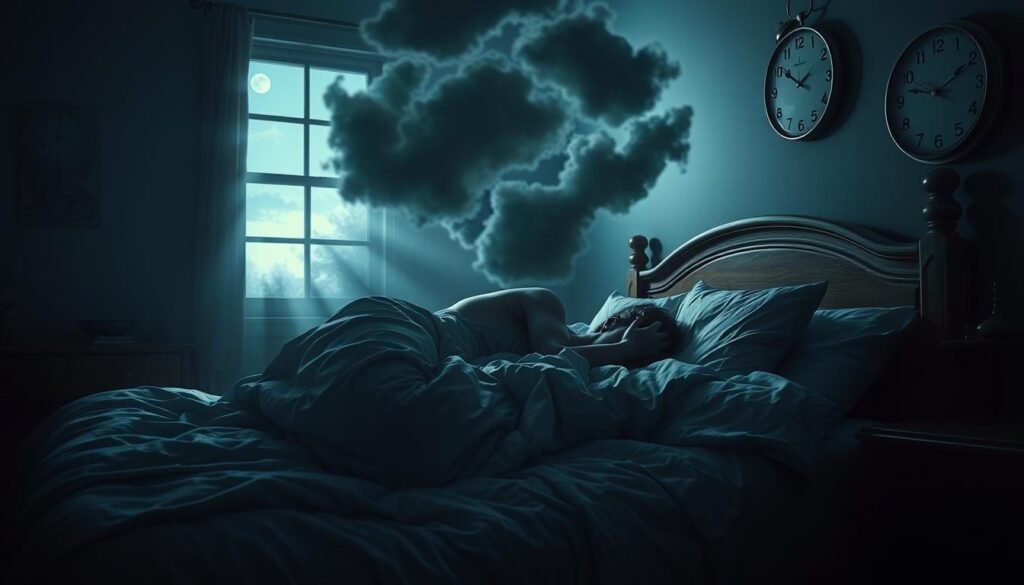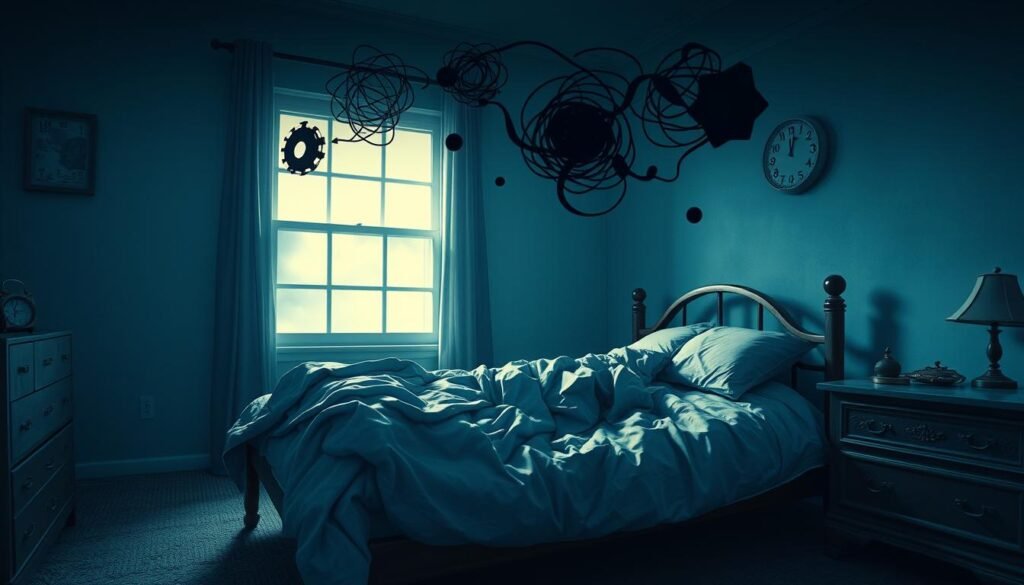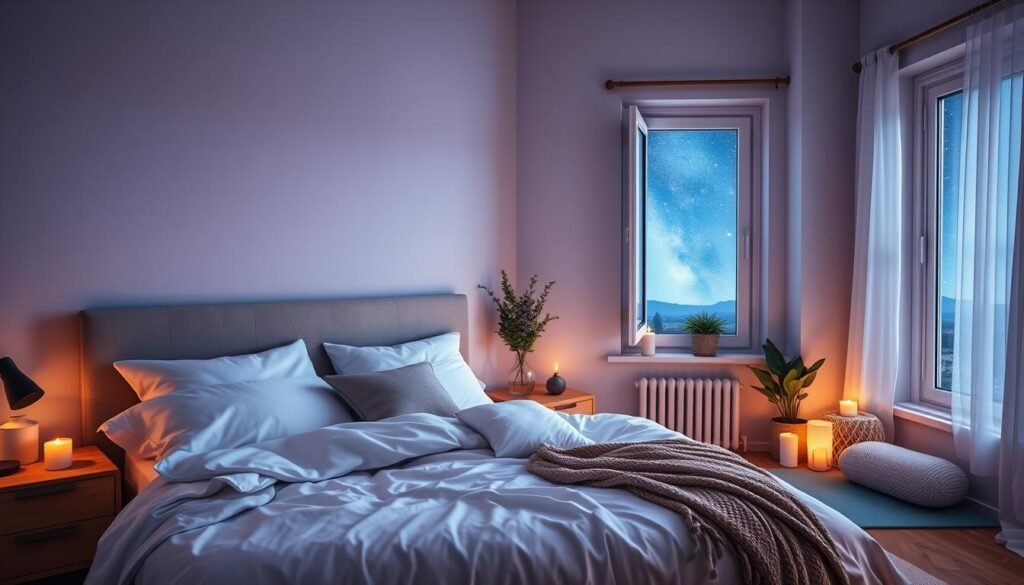Did you know that over 40 million Americans struggle with chronic sleep issues? This fact highlights a major problem for many: how anxiety and sleep are connected. Anxiety disorders impact around 30% of adults at some stage. This shows that anxiety can strongly affect how well we sleep.
This relationship forms a cycle that’s hard to break. When you’re more anxious, you sleep less. And when you sleep less, your anxiety gets worse. It’s important to grasp how these two interact. By understanding this, we can find better ways to improve sleep and reduce anxiety.
Key Takeaways
- The relationship between anxiety and sleep is complex and can create a cycle of worsening symptoms.
- Anxiety-induced insomnia impacts millions, hindering their ability to get restorative sleep.
- Sleep deprivation caused by anxiety can lead to cognitive impairment and mood swings.
- Evidence-based treatments like Cognitive Behavioral Therapy can effectively address both anxiety and insomnia.
- Practicing good sleep hygiene is essential for improving sleep quality and reducing anxiety levels.
- Regular exercise has been shown to reduce anxiety while enhancing sleep quality.
- Prioritizing seven to nine hours of sleep is important for overall mental health and well-being.
What Is Anxiety?
Anxiety is a natural feeling that includes worry, unease, or fear. When feelings get too strong, last too long, or mess with our daily lives, they become anxiety disorders. It’s key to know anxiety symptoms for the right identification and managing. Anxiety can show as nervousness, irritability, tension, and lack of focus. All of which can harm our life quality.
Definition and Symptoms of Anxiety
Anxiety disorders cover conditions filled with extreme fear or worry. Those dealing with these may face many symptoms, hampering their daily functions. Key symptoms are:
- Nervousness or restlessness
- Increased heart rate
- Difficulty concentrating on tasks
- Excessive worrying about everyday things
Understanding these symptoms helps identify them. It also shows why finding the right treatment is crucial.
Prevalence of Anxiety Disorders in the U.S.
Anxiety disorders have a large impact in the U.S. Around 20% of American adults deal with these disorders, making them the top mental health issue. There are different types, each with its own rate of occurrence:
| Anxiety Disorder Type | Percentage of U.S. Adults | Estimated Number |
|---|---|---|
| Generalized Anxiety Disorder (GAD) | 3.1% | 6.8 million |
| Panic Disorder | 2.7% | 6 million |
| Social Anxiety Disorder | 7.1% | 15 million |
| Specific Phobias | 9.1% | 19.3 million |
| Obsessive-Compulsive Disorder | 1.2% | 2.5 million |
| Post-traumatic Stress Disorder | 3.6% | 7.7 million |
Nearly half the people with depression also have anxiety disorders. The prevalence of anxiety disorders in those with sleep issues is also notable. This raises points about their overall effect on daily life.
The Complex Relationship Between Anxiety and Sleep
The link between anxiety and sleep is complex. Anxiety affects sleep quality deeply. It can make falling and staying asleep hard. People with anxiety often feel more stressed and worried. This messes with how well they sleep. Studies have found a cycle where sleep loss and anxiety feed into each other, making both worse.
How Anxiety Impacts Sleep Quality
Anxiety affects sleep in many ways. We spend about one-third of our lives sleeping, so it’s important for our health. Among U.S. adults, 23.4% of women and 14.3% of men have anxiety disorders. These often lead to insomnia or other sleep problems. People with anxiety struggle to relax. This makes starting to sleep or staying asleep all night difficult. Small stresses can even disturb their sleep.
Understanding Sleep Deprivation and Anxiety
Sleep deprivation is more than a lack of sleep; it causes emotional issues and can harm health over time. Not sleeping enough can make it hard to control emotions, hurting mental health. Insomnia is common in those with anxiety, and sleep disorders like sleep apnea often come with anxiety. Knowing this, it’s vital to find ways to sleep better when dealing with anxiety.

| Factor | Impact on Anxiety | Impact on Sleep Quality |
|---|---|---|
| Sleep Deprivation | Triggers emotional instability | Reduces ability to fall asleep |
| Anxiety Disorders | Causes increased worry and stress | Leads to insomnia and sleep apnea |
| Chronic Stress | Heightens anxiety symptoms | Disrupts sleep patterns |
| Emotional Regulation | Deteriorates due to sleep loss | Compromises sleep quality |
The Relationship Between Anxiety and Sleep
Understanding the connection between anxiety and sleep disorders shows a complex, two-way relationship. It deeply affects our well-being. Sleeping well at night is key for both our bodies and minds.
When our sleep is broken, anxiety often goes up. This starts a cycle that’s hard to stop.
Bidirectional Nature of Anxiety and Sleep Issues
Studies have found that sleep problems can make anxiety worse. People with anxiety disorders often can’t sleep well. This lack of sleep then makes their anxiety symptoms stronger.
For example, about 36% of those with an anxiety disorder also have insomnia. It’s important for doctors to treat both anxiety and sleep issues together.
Statistics on Anxiety Disorders and Sleep Disturbances
The data on anxiety and sleep issues is eye-opening. Research shows that 10–30% of people don’t sleep well. And nearly 90% of young people with anxiety have sleep problems.
A 2020 study found that bad sleep can make older adults more anxious. Not seeing these patterns can make treatment less effective.
Also, a 2010 study showed that not sleeping enough can lead to mental health issues. It can increase the risk of anxiety and depression.
Common Sleep Problems Associated with Anxiety Disorders
Anxiety can lead to many sleep issues. It affects sleep quality and overall health. Grasping how anxiety and sleep relate is key. We will look into sleep disorders that anxiety causes.
Insomnia is common in those with anxiety. It shows how closely tied they are. Understanding these links can help manage them.
Sleep Disorders Linked to Anxiety
Research confirms that anxiety-related sleep disorders affect daily life. Insomnia is a big problem for anxious individuals. Between 6-10% of people globally have insomnia. It means trouble sleeping occurs in about one in three adults.
Chronic insomnia involves difficulty sleeping, happening three nights a week for three months. Anxiety thoughts often make it worse.
Besides insomnia, anxiety can cause:
- Sleep apnea
- Chronic nightmares
- Sleep anxiety
Disorders like sleep apnea make anxiety and mental health issues more likely. They raise anxiety and panic levels.
Insomnia and Anxiety-Induced Sleep Issues
Insomnia and anxiety disorders usually occur together. They cause a lot of distress. About 60-70% of people with generalized anxiety disorder (GAD) have sleep problems like insomnia. Those with depression face even more sleep issues.
Low vitamin D and high parathyroid hormone (PTH) levels can make insomnia worse. These impact anxiety. Fears like nightmares or fear of sleep can start from these mental health troubles. Treating insomnia through therapy or medicine can help.
| Sleep Problem | Description | Associated Anxiety Condition |
|---|---|---|
| Insomnia | Difficulties falling asleep or staying asleep | Generalized anxiety disorder |
| Sleep Apnea | Interrupted breathing during sleep | Panic disorder |
| Chronic Nightmares | Recurrent distressing dreams | PTSD, generalized anxiety disorder |
| Sleep Anxiety | Intense fear of not being able to sleep | Anxiety disorders in general |
How Anxiety Disorders Affect Sleep Patterns
The link between anxiety disorders and sleep is complex. Different types of anxiety disorder cause various sleep problems. For instance, individuals with Generalized Anxiety Disorder (GAD) often struggle to fall asleep due to worry. Panic Disorder, meanwhile, can cause panic attacks at night. This disrupts sleep and increases anxiety. Knowing these differences helps us understand how anxiety impacts sleep.
Types of Anxiety Disorders and Their Sleep Disruptions
Each anxiety disorder affects sleep differently:
- Generalized Anxiety Disorder (GAD): Constant worrying makes falling and staying asleep hard.
- Panic Disorder: Panic episodes during sleep can lead to insomnia.
- Social Anxiety Disorder: Worrying about social situations can cause insomnia.
- Post-Traumatic Stress Disorder (PTSD): Insomnia is common due to stressful night events or awakenings.
Research shows that 24% to 36% of those with anxiety disorders have insomnia signs. About 27% to 42% experience excessive sleepiness. This variation harms sleep, especially in college students. Their already poor sleep worsens with irregular sleep schedules.

Neurobiological Factors Involved in Sleep Disruption
Neurobiological factors play a key role in how anxiety disorders disrupt sleep. Serotonin and GABA are important for sleep regulation. If their levels are off, anxiety-related emotional problems can make sleep worse. The body’s stress response also complicates things, causing chronic insomnia or too much sleepiness during the day.
To better manage anxiety and sleep, understanding these factors is crucial. Treatments like cognitive behavioral therapy (CBT) are helpful. For more on managing these issues, visit this site.
Management Strategies for Anxiety and Improved Sleep
Dealing with anxiety can help you sleep better. Using management strategies matters a lot. One key approach is cognitive behavioral therapy for anxiety. It looks at the bad thoughts that lead to both anxiety and sleep problems. This therapy teaches people how to cope and have a better attitude about sleep.
Cognitive Behavioral Therapy for Anxiety
Cognitive behavioral therapy (CBT) is a top method for treating sleep issues related to anxiety. Studies show CBT works by changing the behaviors and thoughts that mess with sleep. Using it for anxiety management can change sleep habits for the better. CBT also deals with anxiety symptoms and teaches coping skills. This makes it great for better sleep.
Sleep Hygiene Practices to Enhance Rest
Good sleep hygiene is key for better rest, alongside therapy. There are simple steps that make a big difference in sleep quality.
- Maintain a consistent sleep schedule by going to bed and waking up at the same time daily.
- Create a relaxing bedtime routine to signal the body that it is time to unwind.
- Limit screen time before bed to reduce exposure to blue light.
- Optimize the sleeping environment by reducing noise and light disturbances.
- Engage in calming activities, such as journaling before bed, to ease anxiety and encourage sleep.
Using these strategies for managing anxiety can help sleep and improve overall health. Sleep disorders are complex, highlighting the need for custom treatment plans. Talk to healthcare providers for an accurate diagnosis and strategies that fit your needs. For extra details on how sleep disorders link to anxiety, check this resource.

| Management Strategy | Description | Benefits |
|---|---|---|
| Cognitive Behavioral Therapy (CBT) | A therapeutic approach that addresses thought patterns contributing to anxiety. | Improves coping strategies and sleep quality. |
| Sleep Hygiene Practices | Daily habits that promote better sleep, such as a consistent schedule. | Enhances overall sleep quality and reduces anxiety symptoms. |
| Relaxation Techniques | Activities like deep breathing and meditation before bedtime. | Calms the mind and body, facilitating an easier transition to sleep. |
Anxiety-Induced Insomnia: Understanding the Condition
Many people struggle with anxiety-induced insomnia. It’s important to know what causes it to treat it well. Anxiety can cause a lot of worry. This worry can keep your mind racing and stop you from sleeping.
When anxiety gets worse, it can lead to a cycle of not sleeping. This makes the problem stick around.
Causes of Insomnia Related to Anxiety
Several things can make people with anxiety have insomnia. Here’s what can happen:
- Racing thoughts: Worrying all the time can keep your brain too busy to rest.
- Physiological hyperarousal: Anxiety can make your heart beat fast and your muscles tight. It’s hard to relax this way.
- Fear of not sleeping: Being scared you won’t sleep can actually make insomnia worse.
- Comorbid conditions: Some disorders like PTSD, generalized anxiety disorder, and panic disorder often come with insomnia.
Effective Treatment Options for Insomnia
There are many ways to help someone with insomnia. These are some of them:
- Cognitive Behavioral Therapy for Insomnia (CBT-I): This method works on the thoughts and actions that cause sleep issues. It’s very effective.
- Medication: Doctors might give medicine like sleep aids, antidepressants, or benzodiazepines to help with insomnia.
- Sleep hygiene improvements: Having a good place to sleep and a regular sleeping time can make a big difference.
- Therapeutic interventions: Working on your anxiety with therapy can also improve how well you sleep.
Treating anxiety-induced insomnia can really improve how you sleep and how you feel. Knowing about the condition is the first step to getting better. This knowledge helps in managing the problem and could lead to recovery from both insomnia and anxiety.
Connection Between Anxiety and Sleep Disorders
Anxiety and sleep disorders are deeply connected in many ways. In the U.S., 20% of adults face anxiety, making it a widespread issue. This often leads to sleep problems, affecting people’s overall health. For instance, half of those with depression also suffer from anxiety, showing how these issues are linked and hard to treat.
There are different types of anxiety disorders affecting people. 3.1% of adults face Generalized Anxiety Disorder (GAD). Social Anxiety Disorder and Specific Phobias impact 7.1% and 9.1%, respectively. These disorders can greatly change how well someone sleeps. Many report having insomnia, finding it hard to fall or stay asleep. Actually, 24% to 36% of insomnia cases are also dealing with anxiety.
Sleep apnea and Restless Legs Syndrome (RLS) make the situation worse. Sleep apnea stops breathing temporarily, heightening anxiety and raising heart risk. RLS causes discomfort that prevents peaceful sleep. These issues can increase anxiety, starting a vicious cycle that’s hard to stop.
Studies show that good sleep helps manage anxiety. Improving sleep quality can lower anxiety levels. It’s crucial to treat sleep problems when dealing with anxiety. Knowing how these two are connected helps doctors find better ways to help. They look at both sleep and anxiety to improve someone’s health.
Research on Anxiety Disorders and Sleep Quality
Recent studies have highlighted how sleep problems and anxiety are linked. They looked into how different people sleep. One big study with 27,911 people found that 21.80% didn’t sleep well. Also, 5.58% showed signs of anxiety. This shows a clear link between not sleeping well and feeling more anxious.
Scientific Findings on Sleep Disturbances in Anxiety
Sleep problems can make anxiety worse. For men, the risk is higher if they sleep poorly. Their risk goes up by 4.60 times. For women, it increases by 3.56 times. Older people, those 60 and up, also suffer more from this. If they sleep poorly, they feel more anxious.
Lifestyle habits like smoking and drinking affect sleep and anxiety. Health issues like high blood pressure and diabetes also play a role. This shows how many things influence sleep and anxiety.
Anxiety is a big problem worldwide, affecting up to 15% of people. In rural China, 7.6% face anxiety disorders. Knowing how sleep problems affect anxiety is key to improving mental health. Click here to learn more about this.
The Role of Neurotransmitters in Anxiety and Sleep
Chemicals in our brain like GABA and serotonin affect sleep and anxiety. Understanding this can help create better treatments. For those with anxiety, half struggle to sleep well. This shows we need plans that help with sleep and anxiety together.
Many people, especially soldiers, face both poor sleep and anxiety. Over 62% of soldiers get less than six hours of sleep. Supporting their sleep and mental health is vital. Learn more about this here.
Conclusion
The link between anxiety and sleep problems is vital to understand. We need to find ways to manage anxiety better for improved sleep. This is key to boosting overall health. Research shows that about 20% of adults and 25% of teens in the U.S. deal with anxiety disorders every year. This often messes with their sleep.
This means doctors should see how anxiety and sleep are related when treating patients. They need to work on both issues together.
It’s important for doctors to use a whole-person approach when dealing with these issues. Things like the right therapy and sleeping well can make a big difference for those fighting anxiety-related sleep issues. For example, cognitive behavioral therapy helps reduce anxiety and leads to better sleep. Choosing the right approach is crucial for effective treatment.
Lastly, if you’re struggling with anxiety and sleep issues, getting help is crucial. Managing both can greatly improve your mental health and life quality. Recent studies, like one on insomnia in young people, show just how important it is to tackle these problems head-on. For deeper understanding, check out this research on related conditions.